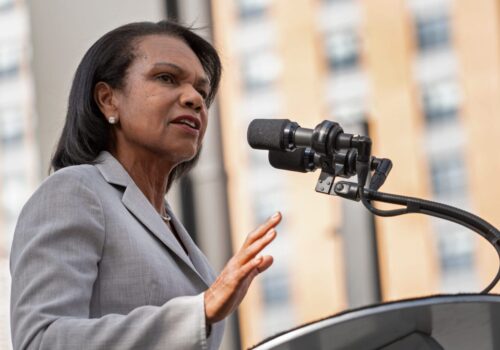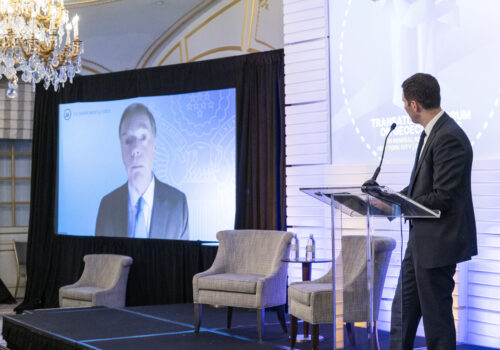The US confronts two global threats: China-Russia and itself
NEW YORK—Two dark clouds hung over the United Nations General Assembly this week in New York. The first was the growing peril of Chinese-Russian common cause. The second was uncertainty about whether US leadership will rise to the challenge after the November elections.
It’s impossible to separate the two issues, as the disruptive dangers of the Chinese-Russian combination—sustaining Russia’s war in Ukraine, fueling the threats of Iran and its proxies in the Middle East, and escalating tensions in Asia—can only be contested and contained by steady, confident, far-sighted US leadership alongside partners and allies.
Speaking to the inaugural Atlantic Council Global Future Forum in New York this week, former US Secretary of State Condoleezza Rice told me during an on-stage interview that she considered our emerging era to be more dangerous than the Cold War. That’s due to the gathering global threats running up against the perils of what she called “the four horsemen of the Apocalypse—populism, nativism, isolationism, and protectionism.”
The United States, Rice explained, “has got to make both a statement and a reality of America’s willingness to remain engaged in the world, because great powers don’t mind their own business. And if we don’t shape the international environment, then others will . . . powers like China and Russia.”
“I just hope that we in the United States can recognize it as such,” she added, “and not fall into a sense that we can simply leave the world to itself.”
‘We’re determined to stop this’
Hypocrisy is nothing new in global affairs, but it’s hard to compete with China’s lip service to the pre-eminence of national sovereignty when weighed against its leading role in Russia’s efforts to crush Ukraine. Without Beijing, senior US officials believe Russian President Vladimir Putin would not be able to sustain his murderous, criminal, ongoing full-scale war in Ukraine, now in its third year.
Senior US and European officials find their Chinese counterparts immovable when confronted with demands that they reduce their support for Russia’s war, far more so than they are on almost any other issue. A high-ranking US official I recently spoke with estimated that Chinese leader Xi Jinping and Putin have had more than sixty personal meetings and a thousand hours of conversation as leaders of their countries. That has allowed them to advance their common cause of undermining US global leadership despite lingering historic grievances and tensions between their nations.
Senior Biden administration officials, speaking to global partners on the margins of the United Nations General Assembly this week, are sharing with whomever will listen intelligence that confirms China’s disconcerting doubling-down in its support for Russia’s war in Ukraine.
Though it seems that China has not yet provided weapons themselves, its support for Russia’s defense industry includes the myriad components and semiconductor chips for Russia’s weaponry, the chemical components for its explosives, the machine tools for its defense industrial machine, and advanced technology that kills Ukrainian civilians and destroys their cities and infrastructure. Moreover, some components provided by US companies to Chinese companies are being resold to other Chinese companies, which then send them off to Russia.
China’s backing makes all the difference. One senior US official told me, for example, that Chinese assistance has allowed Russia to ramp up its tank production from one hundred to one thousand per year.
“We’re determined to stop this,” Nicholas Burns, the US ambassador to China, told the Transatlantic Forum on GeoEconomics, which was also held this week in New York and cohosted by the Atlantic Council and the German think tank Atlantik-Brücke.
“We sanctioned over three hundred Chinese firms over the last several months,” said Burns. “Unfortunately, we’ve not seen a change in Chinese behavior. And so they should expect that we’ll continue in this punitive effort to make our voice clear that we’re not going to stand by as China significantly helps Russia strengthen [not only] its armaments potential, but also its defense industrial base.”
The Russia-China connection isn’t just an issue for US leaders, but also for US partners around the world. It is Russian-Chinese support for Tehran, and through Iran for its proxies, which has imperiled Israel and made the Middle East a more dangerous place as the region faces the threat of a wider war. It is Russian and Chinese support for Pyongyang that is making North Korea an even more dangerous nuclear weapons state.
In the meantime, Pyongyang is providing train loads of ammunition and ballistic missiles to Moscow, and Tehran is providing short-range ballistic missiles and armed drones. Together, this tryst of tyrants not only threatens Ukraine but also Asia and the Middle East.
Outgoing Japanese Prime Minister Fumio Kishida told Washington Post columnist Josh Rogin this week that aggressive dictatorships in Asia such as China and North Korea will be emboldened if Russia is allowed to violate Ukraine’s sovereignty with impunity.
“That is why I have been saying that today’s Ukraine could be East Asia tomorrow,” Kishida told Rogin. “And that is the very reason why I have also repeated that the security of the Euro-Atlantic and the Indo-Pacific are inseparable.”
‘Slam them together’
What can the United States and others do about this gathering threat?
Classic geopolitical tradecraft would suggest that one must either peel off China or Russia through incentives and diplomacy, as then-Secretary of State Henry Kissinger did with China in the 1970s, or frustrate and drive up the cost of their ambitions.
At the Global Future Forum, Rice laid out an approach for whomever is elected US president in November.
Instead of trying to pull China and Russia apart, she instead would “slam them together” and not only make them face the consequences of their actions, but also expose how little they have in common beyond their common cause against the United States and its allies.
Russia’s leaders can’t be pleased that China is supplanting them in Central Asia, Rice said, nor can China be happy that the Houthis, Iran’s proxies, are disrupting sea lanes that above all are moving Chinese goods.
Beyond that, she said, “Chinese banks that are supporting what the Chinese are doing in support of the Russian effort, let’s not let them get away with that. . . . We have to start to impose consequences on this collaboration.”
Whichever US presidential candidate is elected in November will face the same global context, so the only question is the extent to which the newly elected president understands and responds to it. History’s lesson on that is a sobering one.
Ahead of World War II, said Rice, “I don’t think Hitler’s Germany and Imperial Japan and Mussolini’s Italy were all that friendly, really. But they made a lot of trouble in the meantime.” She sees China, Russia, and Iran in that context, and thus argues that they must be “held accountable.”
Rice concluded that the real question for the next US president is whether Russia and China shape the global future or the United States does with its allies. For all the confusing noise of the ongoing presidential campaign, this will be the most crucial, generational challenge for the incoming commander in chief.
Frederick Kempe is president and chief executive officer of the Atlantic Council. You can follow him on X: @FredKempe.
This edition is part of Frederick Kempe’s Inflection Points newsletter, a column of dispatches from a world in transition. To receive this newsletter throughout the week, sign up here.
Further reading
Tue, Sep 24, 2024
Condoleezza Rice: ‘Do you want Russia and China to shape the international environment?’
New Atlanticist By John Cookson
History has shown the dangers of isolationism, the former US secretary of state said to Atlantic Council President and CEO Frederick Kempe at the Global Future Forum in New York.
Thu, Sep 26, 2024
China is ‘aiding and abetting the Russian war machine,’ says US Ambassador to China Nicholas Burns
New Atlanticist By John Cookson
At the Transatlantic Forum on GeoEconomics in New York, the US ambassador spoke about Beijing’s ties with Moscow and about how the United States is responding to Chinese manufacturing overcapacity.
Wed, Sep 18, 2024
Dispatch from Kyiv: The Kursk offensive is working, but Ukrainians are worried about US wobbling
New Atlanticist By John E. Herbst
Morale in Kyiv has been boosted by the early success of the incursion into Kursk, but tempered by concerns over US support.
Image: Russian President Vladimir Putin and Chinese President Xi Jinping shake hands during a meeting on the sidelines of the Shanghai Cooperation Organization (SCO) summit in Astana, Kazakhstan July 3, 2024. Sputnik/Sergei Guneev/Pool




